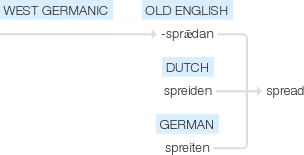Spread
Old English -sprǣdan (used in combinations), of West Germanic origin; related to Dutch spreiden and German spreiten .
wiktionary
From Middle English spreden, from Old English sprǣdan(“to spread, expand”), from Proto-Germanic *spraidijaną(“to spread”), from Proto-Indo-European *(s)per-(“to strew, sow, sprinkle”). Cognate with Saterland Frisian spreede(“to spread”), West Frisian spriede(“to spread”), North Frisian spriedjen(“to spread”), Dutch spreiden(“to spread”), Low German spreden(“to spread”), German spreiten(“to spread, spread out”), Norwegian spre, spreie(“to spread, disseminate”), Swedish sprida(“to spread”), Latin spernō, spargō, Ancient Greek σπείρω(speírō), Persian سپردن (sepordan, “to deposit”), English spurn.
etymonline
spread (v.)
c. 1200, "to stretch out, to lay out; diffuse, disseminate" (transitive), also "to advance over a wide area" (intransitive); probably from Old English sprædan "to spread, stretch forth, extend" (especially in tosprædan "to spread out," and gesprædung "spreading"), from Proto-Germanic *spreit- (source also of Danish sprede, Old Swedish spreda, Middle Dutch spreiden, Old High German and German spreiten "to spread"), extended form of PIE root *sper- (4) "to strew" (see sprout (v.)).
Reflexive sense of "to be outspread" is from c. 1300; that of "to extend, expand" is attested from mid-14c. Transitive sense of "make (something) wide" is from late 14c. As an adjective from 1510s. Related: Spreading.
spread (n.)
1620s, "act of spreading;" 1690s, "extent or expanse of something," from spread (v.). Meaning "copious meal" dates from 1822; sense of "food for spreading" (butter, jam, etc.) is from 1812. Sense of "bed cover" is recorded from 1848, originally American English. Meaning "degree of variation" is attested from 1929. Meaning "ranch for raising cattle" is attested from 1927.
